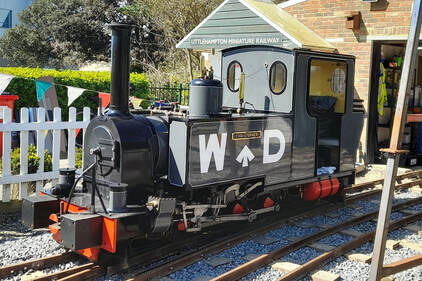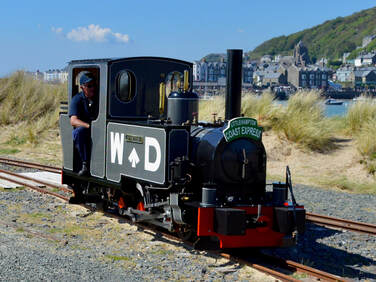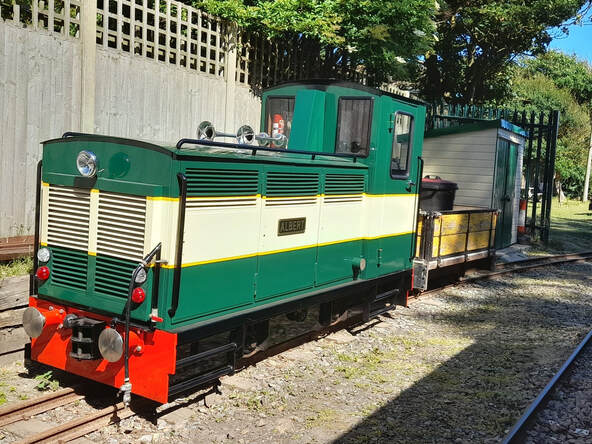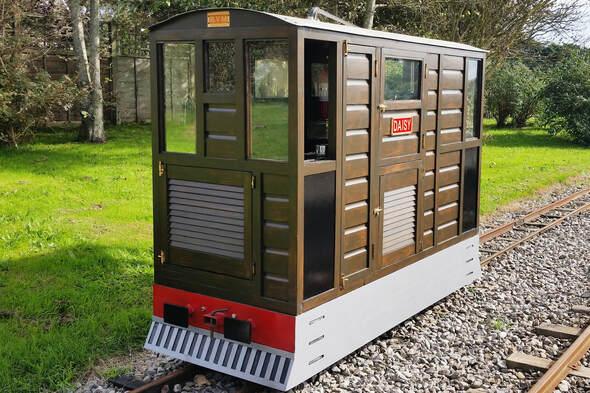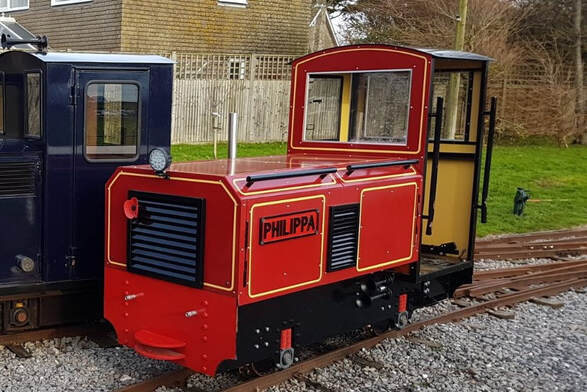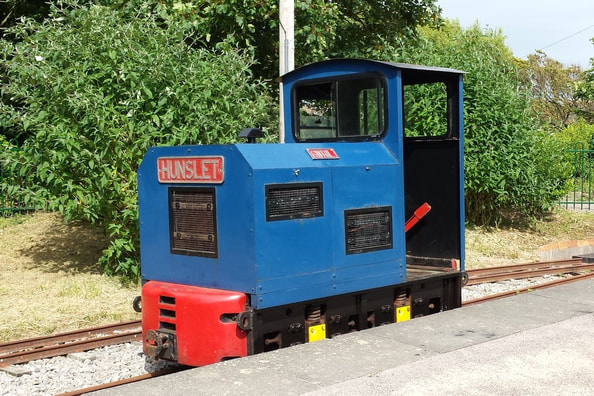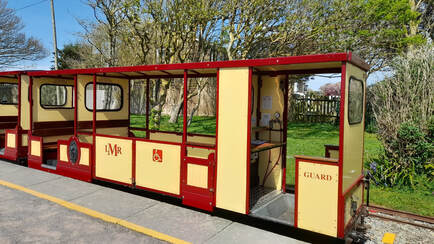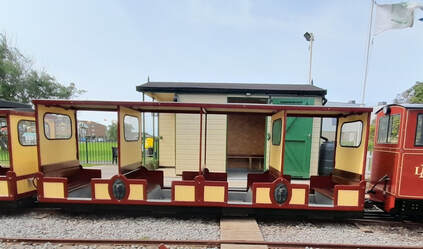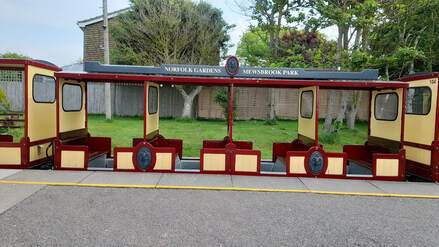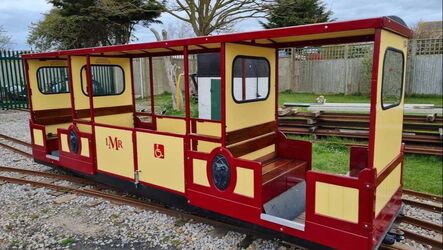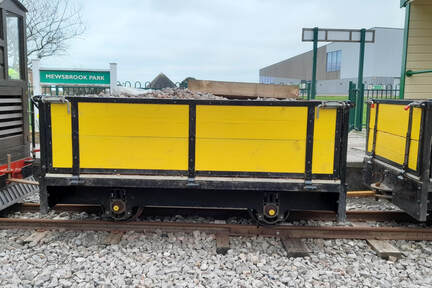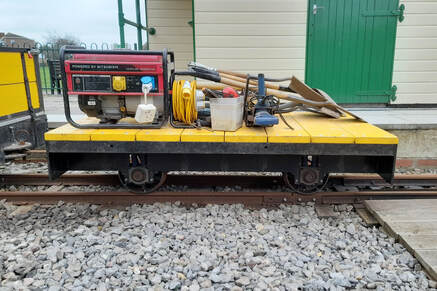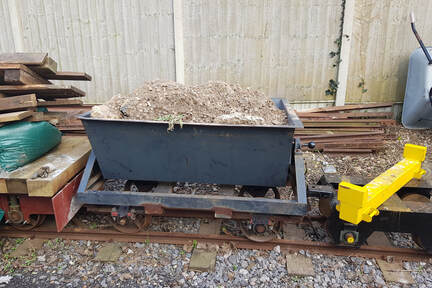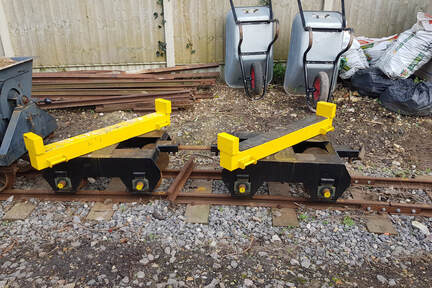Locomotives
2-6-2 tank engine Number 4 'Christopher'
The steam loco arrived in July 2020 after a 2 year rebuild. The engine was originally built by the Exmoor Steam Railway, in 1991; it may have run on their own line plus some visits to other railways. It was built as 12¼ inch gauge and called 'Lorna Doone'. In 2000 it was heavily re-built by Exmoor into a 10¼" 0-6-2 called 'John Remy' which ran at Beale Park in Reading. It had a new boiler and cab/tanks with the old frames and motion. At the end of its 10 year ticket (it is believed) it ended up at Weston Park, until it was acquired by our Chief Mechanical Engineer (CME) Tom Sanders (through Steve Trower) in around mid 2017 - Tom was still building Philippa at that time.
The rebuild started in June 2018, the side frames, buffer beams, cylinders, motion and a few other oddities are original but the wheels, axles, cab, tanks, smokebox etc. are all new and built to a freelance design of Tom's. The cylinders were re-bored with new pistons and valves etc. The boiler is original but has been re-tubed and the washout areas repaired as part of its new 10 year ticket. It was rebuilt into a 2-6-2 to help with the guiding at Littlehampton with the equal forward and reverse running. Tom estimates it has taken in the region of 11,000 hours + work. In the spring of 2021 the loco received its 'Christopher' nameplates and WD lettering on the tank sides.
The steam loco arrived in July 2020 after a 2 year rebuild. The engine was originally built by the Exmoor Steam Railway, in 1991; it may have run on their own line plus some visits to other railways. It was built as 12¼ inch gauge and called 'Lorna Doone'. In 2000 it was heavily re-built by Exmoor into a 10¼" 0-6-2 called 'John Remy' which ran at Beale Park in Reading. It had a new boiler and cab/tanks with the old frames and motion. At the end of its 10 year ticket (it is believed) it ended up at Weston Park, until it was acquired by our Chief Mechanical Engineer (CME) Tom Sanders (through Steve Trower) in around mid 2017 - Tom was still building Philippa at that time.
The rebuild started in June 2018, the side frames, buffer beams, cylinders, motion and a few other oddities are original but the wheels, axles, cab, tanks, smokebox etc. are all new and built to a freelance design of Tom's. The cylinders were re-bored with new pistons and valves etc. The boiler is original but has been re-tubed and the washout areas repaired as part of its new 10 year ticket. It was rebuilt into a 2-6-2 to help with the guiding at Littlehampton with the equal forward and reverse running. Tom estimates it has taken in the region of 11,000 hours + work. In the spring of 2021 the loco received its 'Christopher' nameplates and WD lettering on the tank sides.
Diesel Electric Loco 'Albert'
The Littlehampton Miniature Railway's first locomotive under new management, a diesel electric named 'Albert', was purchased jointly by three association members, and was delivered to the Mewsbrook Park Shed on 23 August 2016. Originally built to 15 inch gauge, 'Albert' was re-gauged to 12¼ inches in October 2016.
The locomotive build was started some years ago by Craig Gluyas, and it was completed in 2016 by Dave Madden and Austin Moss at the Windmill Farm Railway. The loco is powered by a 1.8 litre Ford diesel engine.
The Littlehampton Miniature Railway's first locomotive under new management, a diesel electric named 'Albert', was purchased jointly by three association members, and was delivered to the Mewsbrook Park Shed on 23 August 2016. Originally built to 15 inch gauge, 'Albert' was re-gauged to 12¼ inches in October 2016.
The locomotive build was started some years ago by Craig Gluyas, and it was completed in 2016 by Dave Madden and Austin Moss at the Windmill Farm Railway. The loco is powered by a 1.8 litre Ford diesel engine.
Diesel Hydraulic Tram Engine 'Daisy'
This tram engine named 'Daisy', was built by RVM Engineering , Hastings between September and November 2013, and was fitted with a 1275cc Mini engine. The tram loco was originally named 'Tilby', and ran on the Hastings Miniature Railway until being purchased by the LMR in the spring of 2017. 'Daisy' was re-gauged from 10¼ inches to 12¼ inches before being delivered to the LMR. The loco was rebuilt with a taller, totally new body by our engineers during the summer months. 'Daisy' entered service on 15 October 2017 following her naming ceremony. In the winter of 2020/21 the petrol engine was replaced by a Lister-Petter 3 cylinder diesel engine, which was part of a generator kindly donated to us by the Body Shop. In addition Daisy has received a new hydraulic drive unit and an engine driven compressor to supply air to the coach brakes.
This tram engine named 'Daisy', was built by RVM Engineering , Hastings between September and November 2013, and was fitted with a 1275cc Mini engine. The tram loco was originally named 'Tilby', and ran on the Hastings Miniature Railway until being purchased by the LMR in the spring of 2017. 'Daisy' was re-gauged from 10¼ inches to 12¼ inches before being delivered to the LMR. The loco was rebuilt with a taller, totally new body by our engineers during the summer months. 'Daisy' entered service on 15 October 2017 following her naming ceremony. In the winter of 2020/21 the petrol engine was replaced by a Lister-Petter 3 cylinder diesel engine, which was part of a generator kindly donated to us by the Body Shop. In addition Daisy has received a new hydraulic drive unit and an engine driven compressor to supply air to the coach brakes.
Diesel Hydraulic Locomotive 'Philippa'
Philippa' is a diesel hydraulic engine, built by volunteer member - and Chief Mechanical Engineer - Tom Sanders. It was completed in November 2017 after a 14 month build from scratch. The loco is powered by a 4 cylinder Kubota Diesel engine with a hydraulic transmission.
Philippa' is a diesel hydraulic engine, built by volunteer member - and Chief Mechanical Engineer - Tom Sanders. It was completed in November 2017 after a 14 month build from scratch. The loco is powered by a 4 cylinder Kubota Diesel engine with a hydraulic transmission.
Diesel Hydraulic Locomotive ‘Gwril’
Gwril arrived on loan from the Fairbourne Railway in Wales on 1 July 2016; this loco single handedly managed the busy summer traffic in our first season.
The loco was built by the Hunslet Engine Co. Ltd. Leeds in 1994 to 2 foot gauge - works no. HE9354 - for use in civil engineering contract work including the Jubilee Line extension in London. It was regauged to 12¼ inches and given new bodywork, including an enclosed cab, when it was purchased by the Fairbourne Railway.
Without the cooperation of the Fairbourne Railway in loaning us this loco, we may not have been able to commence services during the summer season of 2016. 'Gwril' returned home to Fairbourne in January 2017.
Gwril arrived on loan from the Fairbourne Railway in Wales on 1 July 2016; this loco single handedly managed the busy summer traffic in our first season.
The loco was built by the Hunslet Engine Co. Ltd. Leeds in 1994 to 2 foot gauge - works no. HE9354 - for use in civil engineering contract work including the Jubilee Line extension in London. It was regauged to 12¼ inches and given new bodywork, including an enclosed cab, when it was purchased by the Fairbourne Railway.
Without the cooperation of the Fairbourne Railway in loaning us this loco, we may not have been able to commence services during the summer season of 2016. 'Gwril' returned home to Fairbourne in January 2017.
Hit this button to see a list of all the locomotives that have seen service on the Littlehampton Miniature Railway
Passenger Coaches
Four 'Safari Express' coaches were built by Severn Lamb in 1979 for the West Midlands Safari and Leisure Park at Bewdley. The Safari Park railway closed in 2013 and the rolling stock found its way to the Windmill Farm Railway in Lancashire.
The Littlehampton Heritage Railway Association purchased all four coaches from Windmill Farm, and they were delivered to Mewsbrook Park at the end of June 2016. Three of the coaches were re-gauged from 15 to 12¼ inches in time for the start of the Summer season, the fourth being converted that September.
A programme of refurbishment commenced in 2018 and was completed in 2021: the work included modifying the sides with cut out sections and increasing the roof height, in order to allow easier access to the compartments, plus weather protection at the coach ends and between some compartments.
The first coach to be refurbished (No. 101) was converted in our workshop in 2018/19: it comprised 2 standard compartments seating 4 persons each; a wheelchair accessible compartment with additional seating for 2 people; and a separate fully equipped guard's compartment. This coach received further modification in 2022 and it now has an enlarged wheelchair compartment with additional seating for 4 passengers. The guards compartment was also extended with increased leg room for the guard, plus the fitting of a desk and storage shelf.
Coach 103 has a slightly lower roof in order to retain its original roof rack, which has been repainted and lettered to show the destinations of Mewsbrook Park and Norfolk Gardens.
The last coach to be rebuilt was number 104. This coach features a four seat compartment at each end and a large easy access central section, seating 4 passengers, which is also adapted for wheelchair use.
The maximum seating capacity of coaches 102 and 103 is 16 adults. All coaches are fitted with continuous air braking operated from a control valve in the locomotives and an emergency brake control fitted in the guard's compartment.
The Littlehampton Heritage Railway Association purchased all four coaches from Windmill Farm, and they were delivered to Mewsbrook Park at the end of June 2016. Three of the coaches were re-gauged from 15 to 12¼ inches in time for the start of the Summer season, the fourth being converted that September.
A programme of refurbishment commenced in 2018 and was completed in 2021: the work included modifying the sides with cut out sections and increasing the roof height, in order to allow easier access to the compartments, plus weather protection at the coach ends and between some compartments.
The first coach to be refurbished (No. 101) was converted in our workshop in 2018/19: it comprised 2 standard compartments seating 4 persons each; a wheelchair accessible compartment with additional seating for 2 people; and a separate fully equipped guard's compartment. This coach received further modification in 2022 and it now has an enlarged wheelchair compartment with additional seating for 4 passengers. The guards compartment was also extended with increased leg room for the guard, plus the fitting of a desk and storage shelf.
Coach 103 has a slightly lower roof in order to retain its original roof rack, which has been repainted and lettered to show the destinations of Mewsbrook Park and Norfolk Gardens.
The last coach to be rebuilt was number 104. This coach features a four seat compartment at each end and a large easy access central section, seating 4 passengers, which is also adapted for wheelchair use.
The maximum seating capacity of coaches 102 and 103 is 16 adults. All coaches are fitted with continuous air braking operated from a control valve in the locomotives and an emergency brake control fitted in the guard's compartment.
Wagons
The permanent way department of the Littlehampton Miniature Railway possesses a number of goods wagons:
Two 2 plank dropside wagons and two flat wagons were built by our Chief Mechanical Engineer (CME) Tom Sanders. The steel frames are based on a design for a 0-4-0 locomotive; the wagons run on second hand wheelsets which came from the Fairbourne Railway; bodywork is made from wood. One of the two flat wagons was rebuilt as a mobile workshop/tool van in 2024, see below.
In 2020, Tom saw a tipping trolley advertised on a well known auction site, he acquired this for the railway and converted it into a tipper wagon. A pair of bogie bolsters have been added to the fleet for carrying rail.
All of these wagons are extremely useful for transporting tools and track materials around the railway.
All of these wagons are extremely useful for transporting tools and track materials around the railway.

